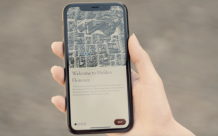Articles

Credit © Hidden Florence, University of Exeter (Freshgroundfilms)
Pioneering app transforms way people experience the history of Florence
The incredible history of Renaissance Florence can be explored through the eyes of characters who lived in the city hundreds of years ago thanks to a pioneering new app.
Hidden Florence is written by an international team of leading historians and voiced by professional actors. By linking unconventional tours of Florence to the everyday lives of Renaissance Florentines, the app brings the people and places of the past to life while opening up areas of the city overlooked by other guides.
The free app allows people to explore the city through tours led by five characters from all walks of life in the fifteenth and sixteenth centuries. People can visit as many as 47 sites, using a sixteenth-century map to navigate the city’s streets.
Users can explore the city through a stunningly detailed map from 1584 – geolocated so they can toggle between it and a modern map of Florence – and walk in the footsteps of the guides, hunting for statutes, street tabernacles, palaces and piazzas.
The characters are Cosimo, Master of Florence, portrayed as he would have been in 1459; a wool worker, Giovanni, who takes people through a day of his life in 1490 and Niccolosa Alessandri, who explores Florence’s sacred foundations in 1492 as the city faces an uncertain future after the death of Lorenzo de’ Medici. Marietta, traces her journey from the city orphanage to life as a silk weaver in 1561 and Ercole talks about Renaissance policing and justice in 1566.
The characters are voiced by professional actors, including James Faulkner, who has been in Game of Thrones and Da Vinci’s Demons, as Cosimo de’ Medici. At each site the historians narrate ‘Discover More’ explainers, and people can use the Hidden Florence website for in-depth historical context.
Hidden Florence began as a prototype in 2014, with only the Giovanni character. This new app has been written by an international team of historians of Renaissance Italy, and is a collaboration between the universities of Exeter, Cambridge and Toronto.
Project leader Professor Fabrizio Nevola, from the University of Exeter, said: “Seeing Hidden Florence grow through a series of important collaborations with university colleagues, major galleries and other stakeholders is really exciting. We’ve brought a number of new stories about this city’s complex history to every visitor’s fingertips, using up to date technologies to present cutting edge research about gender, class and power in an accessible way”.
Hidden Florence’s project partners are the National Gallery (London), Polo Museale della Toscana and Firenze Patrimonio Mondiale (UNESCO). The app is funded by the Arts & Humanities Research Council (UK) through the University of Exeter and is produced by Calvium.
For more see http://hiddenflorence.org. Hidden Florence is available in Apple and Android versions.
Date: 18 June 2019
